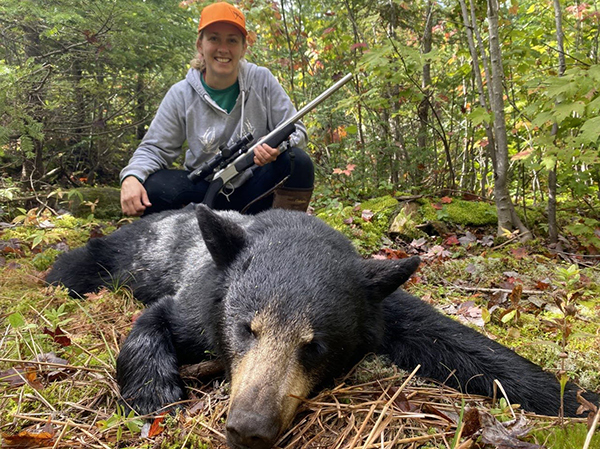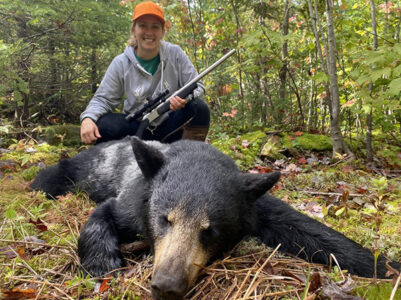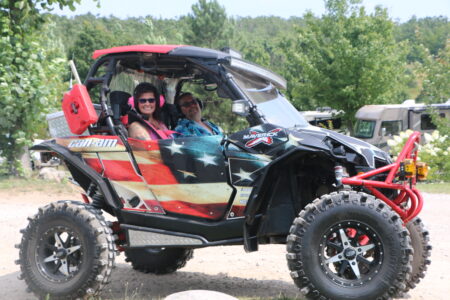100 years of Michigan bear hunting
Bear license applications at an all-time high

Sara Brown of Rapid River harvested her first black bear in 2023 in Marquette County. (Photo courtesy of Don Brown)
On a cold, rainy fall afternoon in 2019, veteran bear hunter Elijah Keller and a friend had spent hours tracking a black bear through the western Upper Peninsula woods.
Soaked and exhausted, the men hustled along to keep up with Keller’s two hounds, at one point sprinting up a hill when the male bear – called a boar – turned to rush the dogs.
“Shoot him!” Keller shouted to his friend, who had never seen, let alone harvested, a bear. “Shoot him!”
The friend froze with his rifle, paralyzed in the chaotic scene.
Keller took the shot instead, and it was successful, but there was no time to celebrate.
The two hunters would soon begin the process of field-dressing and hauling the nearly 300-pound bear out of the Ontonagon County woods before darkness arrived.
“Bear hunting is work,” said Keller, who noted that his friend eventually harvested his own bear. “That’s part of what makes it fun – the challenge, the physical activity, the adrenaline.”
As Michigan marks 100 years of regulated bear hunting, the sport has never been more popular. Whether hunting with hounds or with bait, bear hunters say the experience is uniquely exhilarating.
Other commonalities emerge when you talk to bear hunters.
The sport can quickly become a family affair, with kids often catching the hunting bug after helping out with baiting runs. Just about everyone loves the slightly sweet flavor of bear meat, which is much leaner than ground beef.
And serious bear hunters tend to foster a deep respect for both the rich history of bear hunting and the awe-inspiring animal they pursue.
Don Brown, who bait hunts for bear with his wife, Sara, has harvested several bears in the U.P., using both a vertical compound bow and a rifle.
He harvested his first bear, a 400-pound boar, with a bow in 2011. Brown said he prefers bow hunting because it’s more of a challenge.
“You’re shooting from a closer distance,” he said. “For me, it’s a more up-close, personal experience.”
Brown, who also works as a DNR wildlife biologist in Shingleton, echoed other bear hunters when he said, “The mix of nerves and excitement is nothing like you get from small game or deer hunting.”
“Deer aren’t going to come after you if you make a bad shot,” he said. “It’s a different level of adrenaline, for sure. But it’s fun. It’s pretty intense.”
Bucking the trend
Black bear hunting was first regulated in 1925 when the Michigan Legislature declared the species a game animal. Since 1990, when the state placed bear hunting under a quota system requiring hunters to apply for a license, applications for bear licenses have risen fairly steadily.
In 2025, a record number of hunters – 72,872 – applied for either a state-issued bear license or a preference point toward a future hunt. This year’s bear season kicks off Sept. 10 in the U.P. and Sept. 13 in the northern Lower Peninsula.
Only about one out of every five applicants typically receives a bear license in Michigan’s annual drawing. But year after year, more hunters are applying – all for the chance to harvest a black bear in one of Michigan’s 10 bear management units.
A black bear waits for his pursuers to leave after being treed during a training run in Wexford County. (Photo courtesy of Elijah Keller)
The sport’s increasing popularity is bucking a long-running trend in the United States of fewer hunters taking to the field.
“It’s a success story,” said Cody Norton, a Marquette-based bear specialist for the Wildlife Division of the Michigan Department of Natural Resources. “If we look at hunting numbers nationally, they’re declining every year and yet the number of people applying for a bear license or a preference point in Michigan is increasing.
“So, I think that’s a great thing, but it comes with a cost of more competition for those licenses too.”
Hunters can wait years to get a bear license, particularly in the northern Lower Peninsula, where there are about 2,100 bears compared to 10,350 in the U.P., based on newly released 2024 estimates.
The state drawing is based on a point system; applicants get a point every year they apply, and those with the most points are selected first.
This year, 6,278 hunters received a Michigan bear license – just 21% of the 28,932 people who applied for an actual license. Another 39,953 applied for a preference point, banking that point for the future.
The DNR uses hunting as the primary tool to manage a sustainable bear population.
The front paw of a bear that Elijah Keller harvested with help from his hounds.
About 2,000 bears are harvested every year in Michigan, with a hunter success rate of about 35-40%. Within 72 hours of harvest, hunters are required to take the bear head and hide, or the entire animal, to a DNR registration station to be examined and registered.
“Hunters contribute valuable information to bear management and research needs by submitting teeth and tissue samples, which helps us estimate age, health and population trends,” said Norton, who’s also a bear hunter. “This collaboration between hunters and biologists is essential for maintaining a healthy bear population and balancing conservation goals with hunting traditions.”
Respecting the bear resource
Under Michigan law, hunters must use edible meat from harvested bears.
That’s no problem for the Kellers, the Browns and other hunting families.
“Speaking for my family, bear is hands-down their favorite wild game,” said Elijah Keller, who lives in the Cadillac area with his wife and three young children. “I process my own, and we make roasts, smoked ribs, brats, sloppy joes, chili and all the things you could make with ground meat. Bear is the choice meat in our house.”
Respecting the resource means using as much as possible of every part of the bear, from meat and hides to bones and fat.
The bear hide is a prized material for rugs, clothing and traditional crafts. Skulls can be cleaned and preserved as trophies or educational tools, while bones are used in carvings, tools or even as part of cultural traditions.
Don Brown discusses how he rendered bear fat into this bear grease and using it as a cooking oil.
Bear fat was used by Indigenous communities and early settlers for waterproofing, cooking and medicinal purposes. Don Brown uses the bear grease he renders from his harvests as cooking oil – a healthier alternative to hydrogenated oils like vegetable oil.
The Browns live and hunt on their 80-acre Rapid River homestead in the central U.P. In addition to Don’s three bear harvests, Sara harvested a bear in 2023, and Don has helped his father and brother harvest a bear.
The Browns’ four young children love bear meat – particularly bear snack sticks – and gladly help out with bear baiting and other hunting preparations, looking forward to the day when they can harvest a bear themselves.
“The more people that care about bear hunting and are invested in it, the more we’re helping the future of hunting,” Don Brown said. “This is a very special, once-in-a-lifetime hunt for most folks.”
Keller, who serves as vice president of the Michigan Bear Hunters Association, noted that bear hunting is deeply ingrained in American culture and that the black bear helped sustain native groups and European settlers alike.
“The hunting of these animals is where the value was first placed on them,” he said. “It’s through hunters that conservation is driven.”
The kids take a lunch break on Elijah Keller’s truck during a bear hunting training run.
Keller, who has harvested six bears, raises his own hounds and enjoys training them with family and friends throughout the year, not just during hunting season. He can trace his hound-hunting roots back several generations.
Keller’s great-grandfather emigrated from Finland with his hunting dogs and became an avid bear hunter in the Cadillac area.
“To say I hold the black bear, and moreover hunting with hounds, in high regard would be a drastic understatement,” Keller said. “Bear hunting with hounds shapes your life completely, every day we live it.”
Learn more about Michigan bear hunting at Michigan.gov/Bear.



